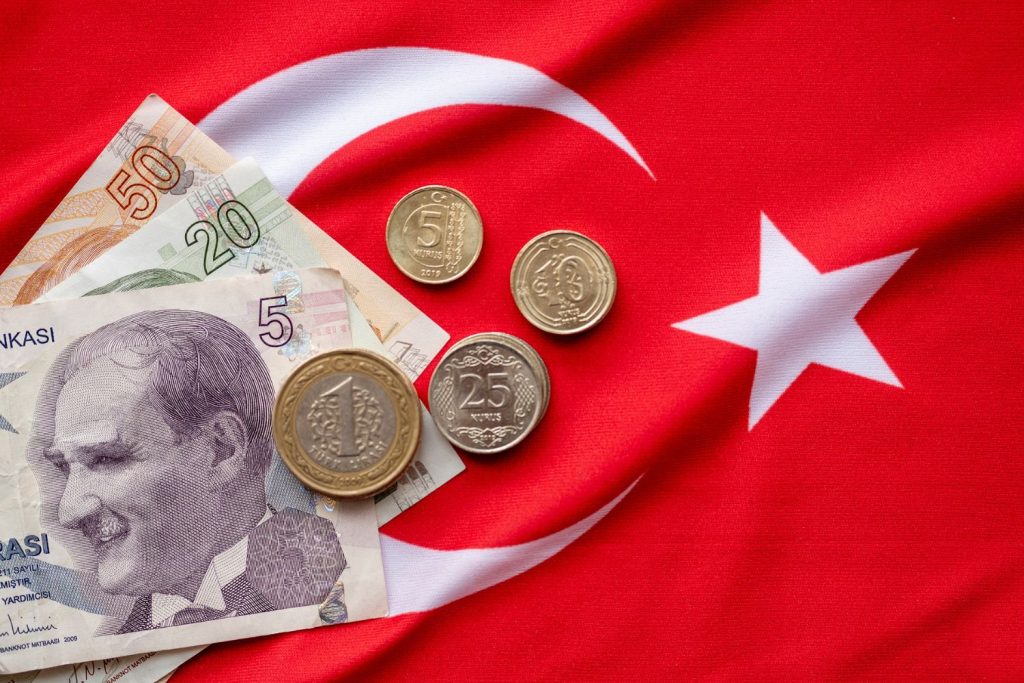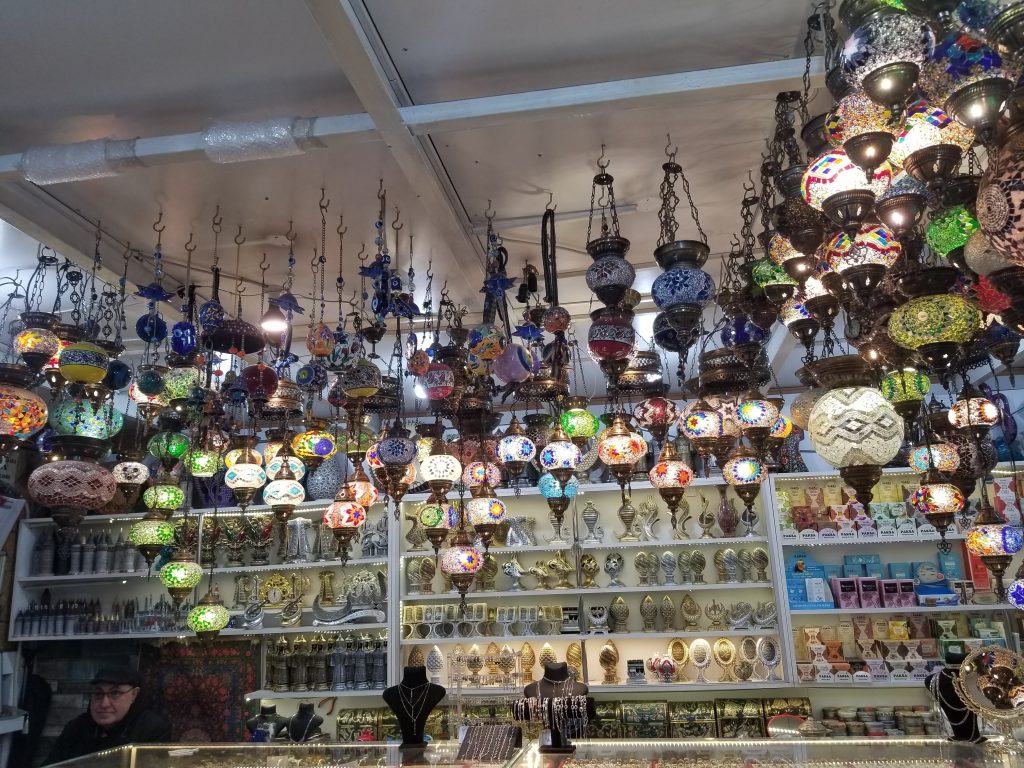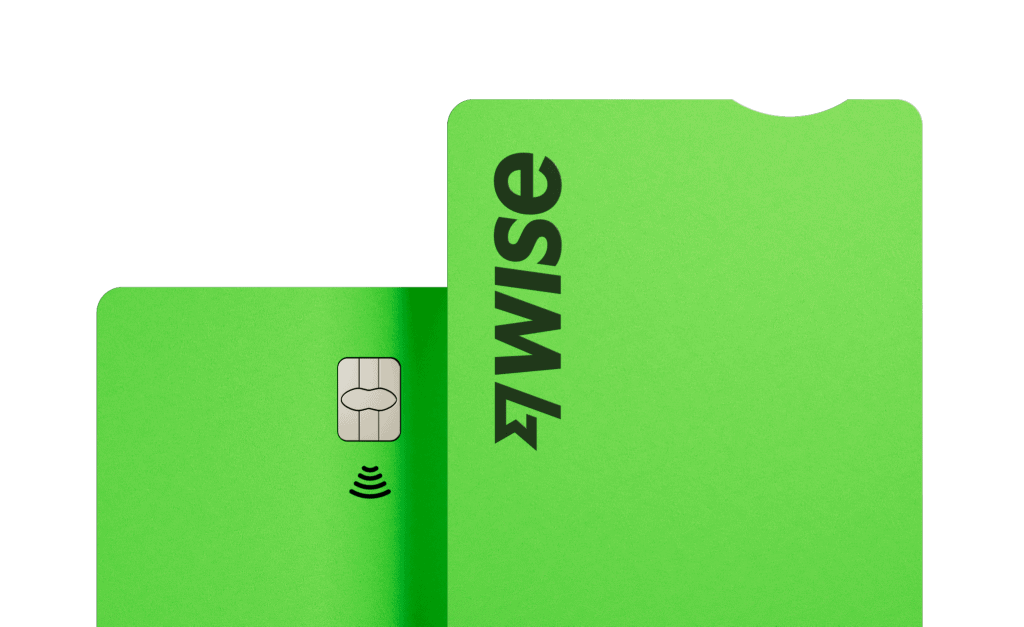Istanbul Currency: All You Want to Know about Turkish Lira

The Art of Living in Turkey contains affiliate links and is a member of the Amazon Services LLC Associates Program. If you make a purchase using one of these Amazon links, I may receive compensation at no extra cost to you. See my Disclaimers for more information.
This guide has everything you need to know about Istanbul currency—the same as the Turkish currency—and how to avoid currency hassles to enjoy a smooth trip!
Traveling abroad is thrilling, but managing your money wisely is crucial to making the most of your time.
Without the right planning, you might find yourself frustrated by unexpected fees or tricky exchange rates, which can vary greatly, even in Istanbul.
Having lived in Istanbul for many years now and having traveled around Turkey, I’ve picked up insights and practical tips that will make managing your money here easier.
From converting currency and handling cash to using cards and spotting exchange pitfalls, I’ll share what I’ve learned so you can focus on enjoying your trip.
Ready to dive in? Let’s make sure you’re fully prepared for every financial aspect of your Istanbul adventure!
about the Lira
The Turkish lira (₺ TL) is the official currency of Turkey and Northern Cyprus.
It is divided into one hundred kuruş (or cents) and has been in circulation since 1844 when it replaced the kuruş as the primary unit of currency in the Ottoman Empire.
The lira was originally based on two systems: 6.61519 grams of pure gold or 99.8292 grams of pure silver.
In 2005, a new law removed the old Turkish lira from circulation and introduced a new series of banknotes with strengthened anti-counterfeiting features called the new Turkish lira.
If you’re into money like my dad (it is always a part of my gift when I see him…money from new countries I have been to) then you might find this article about the features of paper money here interesting.

4 Must-Have travel accessories to keep your money safe
- A money belt is really great to have especially in crowded/touristy areas. This one has RFID blocking and a great price!
- Keep your passport and cards safe with RFID blocking in this passport holder wallet.
- Travelon is my favorite for anti-theft bags. They have a ton of different purses and bags to keep your money safe while traveling.
- If you’d rather have a neck wallet than a money belt, this has RFID blocking built into it as well.
Exchange Rates
In recent years, it has experienced numerous drastic fluctuations due to political and economic unrest in the region.
Despite efforts to stabilize it, its value against other major currencies like the US dollar continues to fluctuate significantly.
You can use this handy calculator to figure out the current exchange rate for the dollar to Turkish Lira or other foreign currencies.
While I could just tell you, it changes too often to make it worth either of our time.
Where should I get my money?
If you’re looking to get Turkish lira, my favorite way to get cash is via my debit card. It is much more safe. If you get pickpocketed or lose all your cash somehow, you are out all of that money and there is no recourse.
Also, things like travelers’ checks are out of date and no one uses them anymore. You likely won’t find anyone who will even know what to do with them. Don’t bring them.
Pro tip: Make sure that when you pull money out of ATMs, you do that at a bank, not a stand-alone ATM. Here’s why:
If you withdraw money from an ATM and it keeps your card, they will send it back to the address attached to it. If it is attached to a bank though, you can go inside and let them know and they can retrieve it for you immediately.
This happened to a friend of mine. The card got stuck in an ATM and because it wasn’t attached to the bank, the card was only retrieved when the machine was serviced and they sent it back to their home in the States. Not good for their trip.
If you are set on bringing USD, you can get it exchanged at a local bank or currency exchange, though the location is important to consider. The exchange offices at the airport are always the most expensive but sometimes necessary.
I have found each cash changing station charges a different fee. I mostly just don’t want to deal with the hassle of figuring out who has a better rate.
I recommend starting with a small amount instead of doing the full amount at the same time if you have to go this route. If you’re an Enneagram 8, you probably will prefer this method….you do you!
Many banks offer competitive rates for buying and selling Turkish lira, making it easy to find the best deal.
You can also use online services such as XE Currency Converter to have a solid understanding of what kind of rate you should be looking for.
No matter which option you choose, make sure to do your research and shop around for the best rate before making any transactions.
Pro tip: Don’t exchange the money before you come. It is always best to do it in the country.
Which is best cash, credit cards, or traveler’s checks?
When visiting Turkey, it’s important to consider what method of payment to use.
Cash is the most widely accepted form of payment in Turkey, and it’s advised to always have some Turkish lira on hand for smaller purchases like taxi rides or market stalls.
Especially if you are outside of typically tourist areas, you will need cash more often than not.

Even if a place has a card machine, they prefer cash because they lose money to the fees charged by the card companies. Cash is also helpful if you want to leave some behind for the person who served you.
You can read more about tipping in Turkey on this post
Credit cards are accepted at most establishments in large cities, but cash is still king in less populated areas.
The one problem that some foreigners experience is that their foreign cards may not be accepted. American Express and Discover are rarely accepted but even with a Visa or Mastercard, some machines won’t work with a foreign card.
In this case, again, it is always good to have a backup debit card and cash.
Traveler’s checks are not very common in Turkey; if you do need them, make sure you find a bank that will accept them before you leave home.
Ultimately, the best method of payment while traveling in Turkey will depend on your personal circumstances – how long you’ll be staying, where you plan on going, and how much cash you feel comfortable carrying around with you.
How should I handle my cash?
If you don’t have a travel bag, I would definitely recommend a money belt especially if you will be in touristy areas like Sultanahmet or Taksim.
Just like most of the world, touristy areas are known for pickpockets. It can be quite crowded and you want to keep your essentials safe!
These days coins aren’t used as much because their prices have risen so much. If you do use coins, the 1 tl and 50 kurus are most preferred as the smaller denominations are just extra weight.
When you travel with a group and you take turns paying for things, I highly recommend the app called Splitwise. It is a free app and makes splitting the bill so easy! Plus you can purchase it for unlimited expenses.
avoiding excessive exchange fees
1. Using a card with international fees:
Most likely your current card has an average charge of 3% of every dollar spent while abroad. If, however, you use certain international cards they have no foreign transaction fees. This is the one I use for travel purchases.
2. Use Local Banks:
You can also exchange at many local banks. This is definitely less expensive than doing it at the airport. While the rates are pretty good, they aren’t the best you can get.
3. Do NOT do cash advances:
If you try to use your credit card as an ATM card you will have to pay cash advance fees which are typically incredibly high interest rates. It is definitely not worth it. There are better options.
4. Fee-Free Debit cards:
When I travel, I use my debit card to pull out some cash. I have a credit union and they have free international withdrawals but I know not everyone has a card like that.
If you don’t, you may consider a WISE account. This is what I use every month to send money to myself because they have the best rates to transfer money.
They also have an international debit card with zero fees!

If you are asked if you want to purchase in USD or TRY, always choose the local currency. If you don’t, there are often hidden fees that could add up over time.
How much cash should I bring to Istanbul?
As I shared above, I typically just pull it from the ATM when I land somewhere.
If you’re going to get some exchanged before you come, you could come with 2,000 lira and that could be enough to get you started.
I recommend you don’t travel with enough cash for your entire trip because it is dangerous. If it gets stolen, you’re up a creek without a paddle.
A couple thousand will cover a taxi. If you wanted to go to a nice place for dinner, you would easily be able to use your credit card.
If you’re curious about how much you should plan to budget for your time in Turkey, here are some suggestions. I do my budgets a little differently than most though.
The daily budget includes housing, food, and transportation.
Then there is an extra lump sum because you won’t do the same attractions every day and wouldn’t need that budget every day.
Budget travel: $32/day plus $15-20 for experiences like hamam and maybe a museum.
Moderate travel: $75/day plus $50-60 for experiences a couple of museums or a nicer hamam
Luxury travel: $180/day plus $200-300 for experiences – museum pass, lux hamam, Bosphorus cruise, fun cooking class, etc.
I also love budgetyourtrip.com’s up-to-date data for planning a budget.
FAQs
How much is 100 Turkey lira in US dollars?
Every day it changes. As of this writing, 100 Turkish lira is about $2.91, €2.67, £2.24. You can use this free calculator at XE.com.
What is the best currency to take to Istanbul?
While you might be able to use Euro or Dollars in touristy areas, you will definitely get a terrible exchange rate. It is always recommended to use local currency, even when you pay with your debit card. Make sure you always have some cash on you as it is definitely preferred to cards here.
Can you use USD in Istanbul?
In some places, yes but it isn’t really worth it because of the poor exchange rate you will get. I definitely recommend using the Turkish lira for anything you do in Turkey.
Is Turkey cheap for USD?
Unfortunately because of the current economic crisis, the dollar goes pretty far. When you visit please make sure you keep to yourself how “cheap” things are as it is hard here for those of us who live here. Inflation is high and our money doesn’t go very far. Expats who live here feel it but you as a tourist likely won’t.
Should I carry cash in Istanbul?
Most definitely! You should always have cash on hand. Cash is king in Turkey. You will get cheaper prices with cash and will always be able to pay whereas if you have a card, you might not be able to.
What is not allowed to be brought to Turkey?
Pretty standard things like drugs, weapons, firearms, and radioactive substances are not allowed. In addition, there is a list of foods that are prohibited: fruit, eggs, meat, dairy products, and fresh or packaged food.
Check out a few Week-long itineraries for Turkey
Final Thoughts on Turkey’s Currency
Of course, if you were wondering “What currency is used in Istanbul?” you now know it is the Turkish Lira, and of course, it is the same currency for Turkey.
The Turkish Lira has experienced both periods of strength and volatility in recent years. Factors such as political instability, inflation, and economic growth have all played a role in shaping the currency’s value.
Despite its challenges, the Turkish government has taken measures to stabilize the currency and promote economic growth.
It remains to be seen how the Turkish Lira will fare in the future, but one thing is clear: its significance cannot be overlooked in the global economy.
If you’re thinking of moving here, make sure you check out the cost of living in Istanbul where I also compare it to a few other big cities.
Read More:
- Here are some apps that you should definitely download before your visit
- Ever wondered if Turkey is Europe or Asia? Read more…
- Thinking of visiting during Ramadan, find out if it is for you
- This Family Resort is the way to go if you’re looking for an all-inclusive
Turkey Vacation Basics
When I plan a trip these are the websites I use. I hope they help you plan your next adventure as well!
FLIGHTS: I am a huge fan of Skyscanner and WayAway.
VISAS: You can use the free e-visa portal here but for a few extra dollars you can use iVisa and someone else will handle any issues that may come up.
E-SIM: When I traveled to SE Asia I discovered e-sims and I’m never going back. Airalo has been easy and cheap!
TRAVEL INSURANCE: I use TravelInsurance.com for my trips abroad.
CAR RENTAL: I have loved working with Discover Cars when I rent cars in country.
AIRPORT TRANSFERS: I have used these transfers many times and they are always great. If you’d like more options, I also recommend GetTransfers.com as they allow you to compare companies.
ACCOMMODATION: Find the best Turkey hotel deals on Booking.com.
CITY TOURS & DAY TRIPS: You can browse GetYourGuide’s website to find just the tour you’re looking for! We also recommend the MegaPass for major cities.



